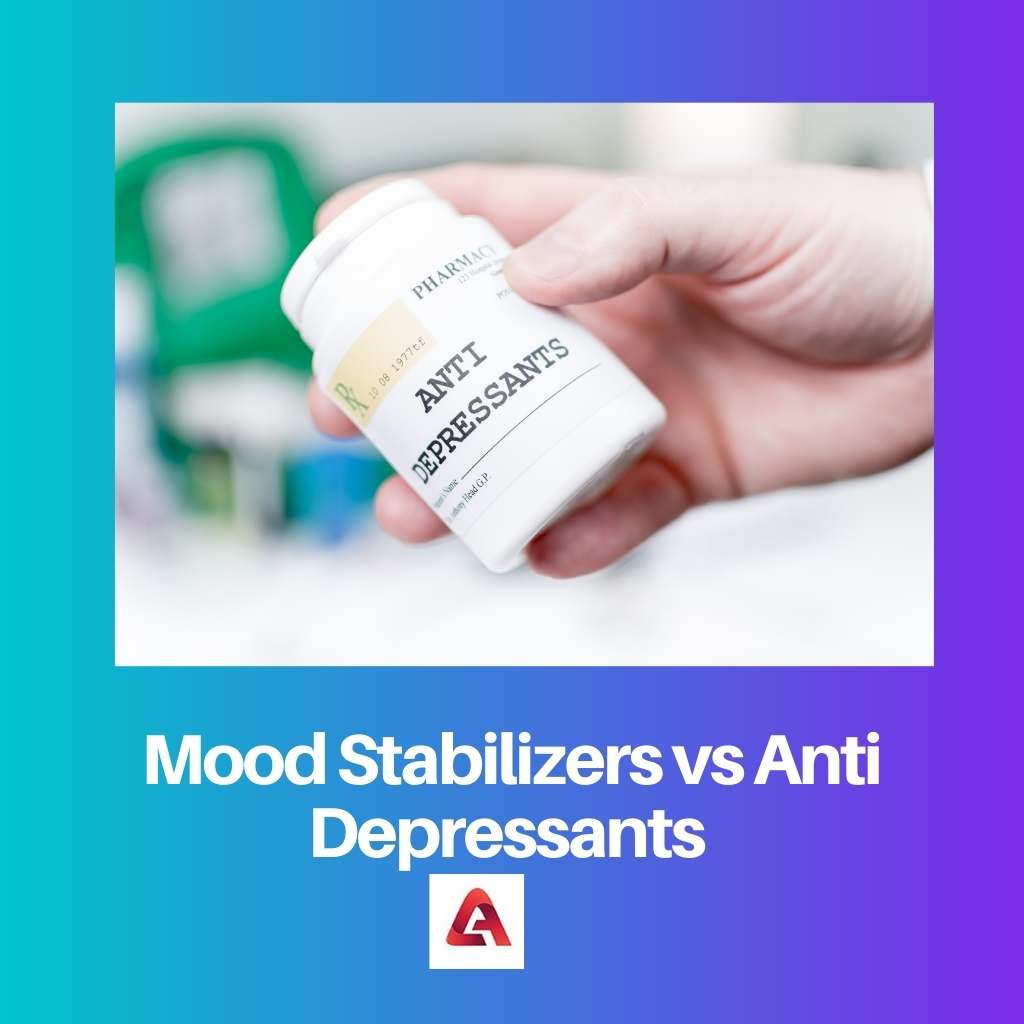Both the terms Mood stabilizers and Anti-depressants are medications that are used for treating different forms of disorders, which are depressive and other conditions such as anxiety, sleeping problems, disorders related to eating, etc. Mood stabilizers are considered very effective in the regulation of the mood of a person, whereas, Anti-depressants are well known for lifting one’s mood. Let us understand the difference between the two medications in more detail.
Key Takeaways
- Mood Stabilizers are medications used to regulate and stabilize mood in individuals with bipolar disorder, while Anti-depressants are medications used to treat depression and anxiety disorders.
- Mood Stabilizers take longer to produce noticeable effects compared to Anti-depressants.
- Mood Stabilizers have a lower risk of causing manic episodes than Anti-depressants in individuals with bipolar disorder.
Mood Stabilizers vs Anti Depressants
Mood stabilizers are medications that help stabilize a person’s mood with bipolar disorder. They can help prevent manic episodes and depressive episodes. Antidepressants are medications used to treat depressive disorders. They work by increasing the levels of certain neurotransmitters in the brain.

Mood stabilizers are very important for those people who undergo a lot of mood swings. These medications will help them to stabilize the fluctuations in their mood. The stabilizers will ensure that their moods are not too high or too low.
Antidepressants, on the other hand, help in the treatment of disorders related to depression. These medications tend to work on serotonin, a neurotransmitter that helps send signals between the nerve cells.
Comparison Table
| Parameters of Comparison | Mood Stabilizers | Anti Depressants |
|---|---|---|
| Used for | Treating mood swings of a person | Treating depressive disorders |
| Time of action | They take 2-3 weeks to start showing their effects | Clinical effects take several weeks to manifest |
| Types | Lithium, tryptophan etc. | Tricyclic anti-depressants (TCA), Atypical anti-depressants etc. |
| Action | They tend to decrease the activity of the brain so that it can restore neurochemical balance | They help in promoting the activities of the brain |
| Side effects | Include dizziness, weakness in muscles, nausea etc. | Fatigue, insomnia, mild discomforts etc. |
What Are Mood Stabilizers?
A mood stabilizer is defined as a psychiatric medication that is used for treating mood disorders that are characterized by intense mood swings, for example, bipolar disorder, which is a very serious mental illness including severe changes in the mood of a person and extreme depressive feelings as well. Mood stabilizers are considered antimanic agents, meaning they can effectively treat mania and shifts in mood.
Mood stabilizers aim to regulate and stabilize a person’s mood by enhancing either serotonin or GABA, where serotonin is the happy hormone, and GABA is the calming hormone in our body. Several mood stabilizers, such as Lithium and VPA, have shown good results and have been proven very effective as well. Taking these medications regularly can help in the prevention of the symptoms of mania and depression.
Mood stabilizers are not addictive, someone who is taking these medications doesn’t develop tolerance. If these medications are stopped, then it might lead to risks of relapses.
What Are Anti-Depressants?
Antidepressants are drugs that help a person in the reduction of symptoms related to depressive disorders, which are very severe. It alters the chemical imbalances of the neurotransmitters which are present in the brain. These changes in the mood and behavior of a person arise due to the chemical imbalance.
They also help in treating anxiety disorders and other psychological conditions of a person. Antidepressants help promote the brain’s activity and avail the excitatory neurotransmitter as well. The side effects of taking antidepressants vary from one type to another as well as from one person to another. The symptoms of depression show a lot of fluctuations, and one antidepressant may help a person by providing a lot of relaxation. For example, if a person is having trouble sleeping, then an antidepressant is a good option which is slightly sedating as well. The side effects of antidepressants vary from one medication to another and from person to person.
Some examples of antidepressants are selective serotonin reuptake inhibitors that are SSRIs, these are the most widely prescribed type of antidepressants and another one is tricyclic antidepressants, i.e., TCAs are a very old type of antidepressant that is no longer very much in use.
Main Differences Between Mood Stabilizers and Anti Depressants
- Mood stabilizers are used to treat mood disorders, bipolar disorder, mania, etc., whereas Antidepressants are used for treating severe depressive disorders.
- Both mood stabilizers and antidepressants must be taken separately, as the combination of the two may not be effective.
- Mood stabilizers decrease the activity of the brain, on the other hand, antidepressants promote the activity of the brain.
- Mood stabilizers are given to a person suffering from bipolar disorder, but antidepressants are not recommended for a bipolar patient as they might switch the patient from the depressive phase to the maniac phase.
- The side effects of taking mood stabilizers are nausea, weight gain, acne, shaking, etc., and the side effects of taking antidepressants are insomnia, fatigue, pain in muscles, etc.



